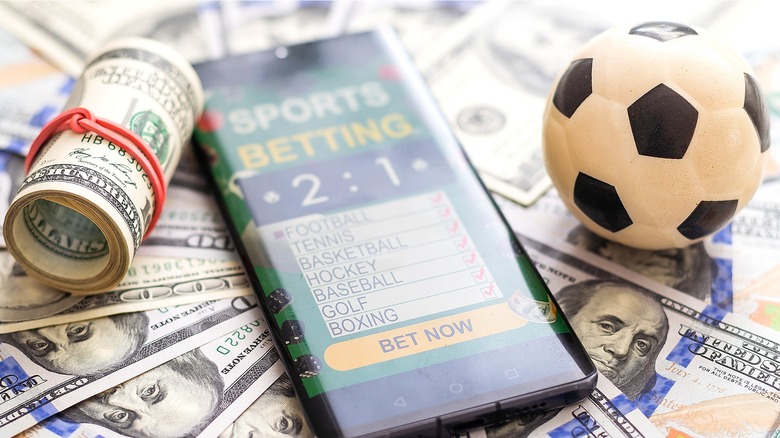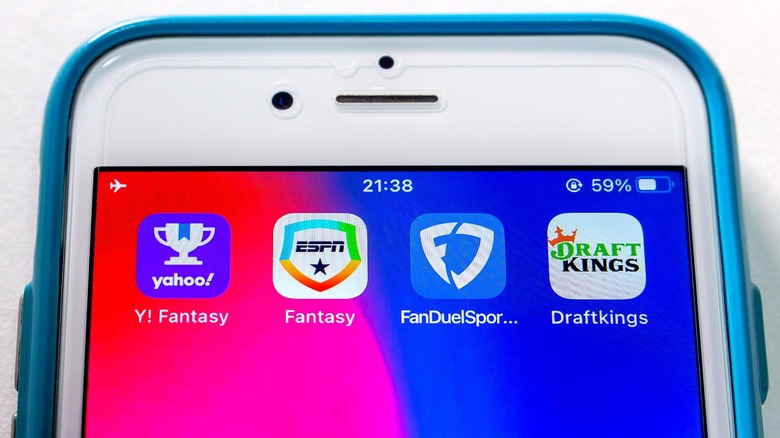The Biggest Mistakes New Users Make On Sports Betting Apps
Sports betting today is now legal in 38 states, as well as the District of Columbia and Puerto Rico, per the American Gaming Association, with legislation ongoing in two more states (one of which is California). Meanwhile, while there's no legislation in the 10 other states, three out of four states is still a lot of new legal gambling on sports. It wasn't long ago that such a scenario seemed unlikely, but these days, you can start betting on sports within minutes of downloading a sports betting app.
The United States Supreme Court in 2018 overturned PASPA, the Professional and Amateur Sports Protection Act of 1992, more than 25 years after it was enacted, on grounds that the law conflicted with the 10th Amendment. Since that 2018 judicial ruling, the proliferation of legal sports betting in America has been swift, and with its spread, new bettors are placing bets on sports betting apps for the first time every day.
According to Statisa, there were an estimated 25.02 million sports bettors in the U.S. in 2022, with this number expected to rise by 32% by 2025. If you're among these new sports bettors, you've likely learned quickly that betting on sports and winning isn't an easy endeavor. After all, just to break even means you need to win 52.4% of your bets. So, as a new better, it's a good idea to keep that number in mind to keep your perspective, as well as try to avoid these more common rookie sports betting mistakes.
Ignoring your betting limit
As mentioned, it doesn't take long to figure out there's a lot of risk involved in betting sports. You could lose money quickly if you're not careful, and the fact it's so easy to deposit funds in an account is part of that equation as well. As for your account, one mistake new bettors make is ignoring their betting limit, or not setting one to start. Instead, you should approach the amount you bet in the same way you set up a monthly budget or a target for building your emergency fund. If, for example, you decide $100 is your limit, especially as a novice bettor, you should stay with that amount, no matter if you're on a winning streak or lost your money and are hoping to win it back with one big parlay.
As sharps, or expert bettors, will tell you, it's nearly impossible to win everything back in one fell swoop. To put this in perspective, let's return to that break-even number: 52.4%. Consider, according to WagerTalk, a sports gambler reaches sharp status if they can win 55% of their bets. So, they will lose 45% of the time. It's similar to a batting average, where a great one is at or above .300, but that also means you record an out seven out of 10 times. So, when it comes to betting limits, be sure not to make the mistake of ignoring yours. Set one to start to keep your wagers under control, and stick to it, no matter how you're doing (or how easy sports apps make it to add more money).
Believing in the gambler's fallacy
The gambler's fallacy isn't something that only novice bettors fall victim to, but being new to sports betting, you might not realize you're using this logic when placing a bet on your sports betting app of choice. A gambler's fallacy is basically believing a future event is more likely based on the series of events that preceded it. However, because the events are random, this kind of thinking doesn't work. If it does turn out how you puzzled it out, it'll be a coincidence.
For example, say you're betting on a basketball team that's won 10 times in a row, and then you bet on them to lose their next game because they're due to lose, that's a gambler's fallacy. A team's streak doesn't determine what will happen next. They may very well lose the game as you predicted, but if they do, it'll be because of what happens in that specific game, like the star forward gets injured and doesn't play in the second half or the opposing team's point guard scores 50. It won't be because the team went 10 out of 10 in their previous 10 games.
Betting on parlays
Similarly, betting on future parlays isn't unique to novice bettors. However, more seasoned betters might better understand the odds they're taking on. A parlay is when you wager on two or more bets together for a greater payout. To win, you need to hit on each of the bets. As you can imagine, this is difficult to do. It's like choosing numbers in a lottery. You may get one or two or three, but to get all five, plus the power number, those odds are extraordinary. For example, to win Powerball, the odds are one in 292.2 million, per The Associated Press.
Now, parlays, aka combo bets, don't have those kinds of odds, but it's still difficult to come out a winner. Yet, parlays are extremely popular among sports bettors because it's cheaper to get a bigger payout; though, again, the risk of winning nothing is also greater. For example, if you bet a four-leg parlay, and you hit on bets 1, 2, and 4, you lose, because you were wrong on the third bet. But, if were right on all four, you'd win even more than if you had placed money on each individual bet.
Going with your heart (over your head)
Data is extremely important when it comes to sports betting. To make an informed bet, you need to have all the information possible on the teams, as far as player health, who's struggling, and how the team matches up against their opponent. New bettors have access to this information through sports betting apps and websites, and many may already factor this data into their wagers, but, being new to sports betting, they also might let their heart be a factor, too. Being a fan, it's only natural you want to support your favorite team or player but when it comes to sports betting — doing so can end with you losing money as a result.
This said, betting on your team can be your edge. You know your team well; you've followed them all year and for years before this. This actually relates to another mistake new bettors can make, and that's betting on sports or teams that they're unfamiliar with. Again, data is key in sports betting, and when you bet on a sport or team you don't know, you're not giving yourself a fair chance. So, betting on your favorite team makes betting sense; just make sure you don't let your heart override the facts (like, your team's defense has been depleted by injuries the last two weeks). Also, if you can't bring yourself to bet against your team, maybe click out of the betting app altogether and sit this one out.
Having unrealistic expectations on bets
Like investing in the stock market as a beginner, it's important to keep your expectations in check when it comes to betting on sports betting apps. As noted, a successful bettor wins 55% or more of the time. As a novice, be sure you don't start betting with the idea that you're going to make money quickly. In the end, betting on sports requires taking the long view, with the knowledge that you're likely going to lose a good deal more than you win, especially at the beginning. Once you bet for longer, you'll be able to gain perspective on your wins and losses.
Finally, be sure to read the fine print when it comes to promotions and/or bonuses. A sports betting platform's promotion might very well be why you've decided to try sports betting, but don't make the new bettor's mistake of not understanding the rules with regard to eligibility, the promotional period, promo codes, qualifying bets, and minimum odds. Be sure you understand exactly what is meant by words like "free" or a "risk-free" bonus (via CNN Business). For new sports bettors, it's especially important to be completely sure of what you're signing up for when you do.





